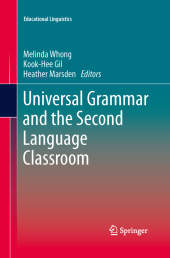 Neuerscheinungen 2015Stand: 2020-02-01 |
Schnellsuche
ISBN/Stichwort/Autor
|
Herderstraße 10
10625 Berlin
Tel.: 030 315 714 16
Fax 030 315 714 14
info@buchspektrum.de |

Kook-Hee Gil, Heather Marsden, Melinda Whong
(Beteiligte)
Universal Grammar and the Second Language Classroom
Herausgegeben von Whong, Melinda; Gil, Kook-Hee; Marsden, Heather
Softcover reprint of the original 1st ed. 2013. 2015. x, 252 S. 43 SW-Abb. 235 mm
Verlag/Jahr: SPRINGER NETHERLANDS; SPRINGER 2015
ISBN: 9401784191 (9401784191)
Neue ISBN: 978-9401784191 (9789401784191)
Preis und Lieferzeit: Bitte klicken
This book proposes that research into generative second language acquisition (GenSLA) can be applied to the language classroom. Assuming that Universal Grammar plays a role in second language development, it explores generalisations from GenSLA research. The book aims to build bridges between the fields of generative second language acquisition, applied linguistics, and language teaching; and it shows how GenSLA is poised to engage with researchers of second language learning outside the generative paradigm.
Each chapter of Universal Grammar and the Second Language Classroom showcases ways in which GenSLA research can inform language pedagogy. Some chapters include classroom research that tests the effectiveness of teaching particular linguistic phenomena. Others review existing research findings, discussing how these findings are useful for language pedagogy. All chapters show how generative linguistics can enhance teachers´ expertise in language and second language development.
"This groundbreaking volume ably takes on the gap that currently exists between generative linguistic theory in second language acquisition (GenSLA) and second language pedagogy, by gathering chapters from GenSLA researchers who are interested in the relevance and potential application of their research to second/foreign language teaching. It offers a welcome and thought-provoking contribution to any discussion of the relation between linguistic theory and practice. I recommend it not only for language teachers interested in deepening their understanding of the formal properties of the languages they teach, but also for linguists interested in following up on more practical consequences of the fruits of their theoretical and empirical research." Donna Lardiere, Georgetown University, Washington DC, USA
Acknowledgements .- 1. Introduction: Generative second language acquisition and language pedagogy by Melinda Whong, Kook-Hee Gil and Heather Marsden .-
Part I: GenSLA Applied to the Classroom . 2. What research can tell us about teaching: The case of pronouns and clitics by Joyce Bruhn de Garavito .- 3. L2 Acquisition of null subjects in Japanese: A new generative perspective and its pedagogical implications byMika Kizu .- 4. Verb movement in generative SLA and the teaching of word order patterns by Tom Rankin .- 5. Modifying the teaching of modifiers: A lesson from Universal Grammar by David Stringer .- 6. The syntax-discourse interface and the interface between generative theory and pedagogical approaches to SLA by Elena Valenzuela and Bede McCormack .- Part II: GenSLA and Classroom Research . 7. Alternations and argument structure in second language English: Knowledge of two types of intransitive verbs by Makiko Hirakawa .- 8. Quantifiers: form and meaning in second language development by Kook-Hee Gil, Heather Marsden, and Melinda Whong .- 9. Explicit article instruction in definiteness, specificity, genericity and perception by Neal Snape and Noriaki Yusa .- Part III: GenSLA, the Language Classroom, and Beyond .- 10. Whether to teach and how to teach complex linguistic structures in a second language by Roumyana Slabakova and Maria del Pilar García Mayo .- 11. Great expectations in phonology: Second language acquisition research and its relation to the teaching of older and younger learners by Martha Young-Scholten .- 12. Applied Generative SLA: The need for an agenda and a methodology by Melinda Whong .- Subject index
From the reviews:
"This book will be of great interest to researchers in GenSLA, language pedagogy and advanced students in linguistics. Second language teachers will also benefit, although the theoretical discussion may be somewhat advanced for those lacking a solid linguistic background. ... It shows the need for research combining GenSLA and classroom teaching. It surely opens the field for interdisciplinary research in all areas of linguistics and all areas of language pedagogy." (Alexandra Galani, The Linguist List, May, 2014)


